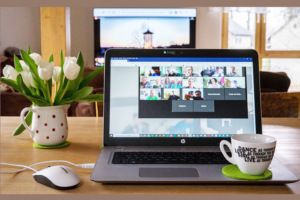Opinion
UK-DK Trade: We are all telecommuters now
Gareth Garvey
This article is more than 5 years old.

You silly boy: if you adjust your camera, the font on your mug will be easier to read (photo: Pixabay)
When I lived in the UK, I and many other busy Brits liked to complain and boast simultaneously about how many miles we drove and how many hours we spent on the road.
Then as an international consultant, I complained/boasted about the ridiculous number of air miles I had accumulated.
I have now found myself doing the same thing when discussing video conferencing.
We’re all Zoomed
The hours we spend on Zoom has become the new benchmark.
But there is a big difference. Whereas miles used to help me justify having a top-of-the-range company car, Zoom and other similar tools are challenging the way we work. And not before time.
Far too many people spend far too much time and money getting from A to B in order to do something we could have done at A. And we pollute the environment in the process.
Permission to speak, sir
My organisation, like many others, has been experimenting with using Zoom for webinars, meetings, and even social events. We have been able to do things at different times of the day.
We have been able to turn a Copenhagen event into a global event. We have been able to deliver joint events with other organisations. We have even managed to hold some really fun, international pub quizzes. Watch out Stephen Fry.
‘Zooming’ has become normal. Why don’t we grab it with both hands, do it properly and reap the benefits?
Noses: don’t like it up ‘em
I have a few niggles. None of us want to look up the noses of our Zoom-mates – especially in a business call. Put your camera at eye height – you will also look better.
Think about sound quality. Avoid rooms with echo. Good microphones and/or soft furnishings help.
And just because we can be in the meeting, it does not mean we have to be. The number of hours spent per day in video conferences is not a badge of honour or something to boast about. Run meetings with a discipline and only attend the parts where you can contribute.
I don’t want to understate the need we all have for physical social interaction. I have missed the theatre and my favourite bars and restaurants, but if we can save some time by working differently, we will have more time for proper and enjoyable social contact – hopefully soon.

About
Gareth Garvey
Gareth (gareth@bccd.dk), who has a passion for creativity and innovation in business, has been the CEO of the British Chamber of Commerce in Denmark since the start of 2017. Gareth has a background in management consultancy working for Price Waterhouse, PwC Consulting and IBM, and he also teaches at Copenhagen Business School.










































